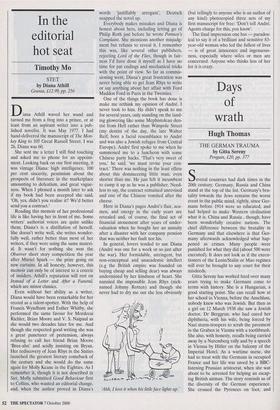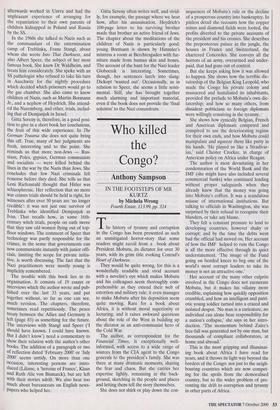Days of wrath
Hugh Thomas
THE GERMAN TRAUMA by Gitta Sereny Penguin, £20, pp. 377 Several countries had dark times in the 20th century. Germany, Russia and China stand at the top of the list. Germany's bru- tality towards the Jews remains the worse event in the public mind, rightly, since Ger- mans before 1914 were so educated, and had helped to make Western civilisation what it is. China and Russia , though, have been wonderfully creative nations. The chief difference between the brutality in Germany and that elsewhere is that Ger- many afterwards acknowledged what hap- pened as crimes. Many people were punished for what they did (about 500 were executed). It does not look as if the execu- tioners of the Lenin/Stalin or Mao regimes will ever be brought to any court for their misdeeds.
Gitta Sereny has worked hard over many years trying to make Germans come to terms with history. She is a Hungarian, a good starting point. She can recall how at her school in Vienna, before the Anschluss, nobody knew who was Jewish. But then as a girl on 12 March 1938 she saw a Jewish doctor, Dr Berggrun, who had cured her diphtheria, with his wife, being forced by Nazi storm-troopers to scrub the pavement in the Graben in Vienna with a toothbrush. She also, with honesty, recalls being carried away by a Nuremberg rally and by a speech in Vienna by Hitler on the balcony of the Imperial Hotel. As a wartime nurse, she had to treat with the Germans in occupied France and her life was saved by a BBC- listening Prussian aristocrat, when she was about to be arrested for helping an escap- ing British airman. The story reminds us of the diversity of the German experience. She crossed the Pyrenees on foot, and afterwards worked in Unrra and had the unpleasant experience of arranging for the repatriation to their own parents of children kidnapped in Poland and Russia by the SS.
In the 1960s she talked to Nazis such as the commandant of the extermination camp of Treblinka, Franz Stangl, about whom she wrote Into That Darkness, and also Albert Speer, the subject of her most famous book. She knew Dr Waldheim, and treats him considerately. She spoke with an SS pathologist who refused to take his turn in Auschwitz for the nightly procedure which decided which prisoners would go to the gas chamber. She also came to know children of Nazis, such as Martin Bormann Jr., and a nephew of Heydrich. She attend- ed the Nuremberg, and other, trials, includ- ing that of Demjanjuk in Israel.
Gitta Sereny is, therefore, in a good posi- tion to give in a short book her 'conclusions, the fruit of this wide experience. In The German Trauma she does not quite bring this off. True, many of her judgments are fresh, interesting and to the point. She reminds us that more non-Jews — Rus- sians, Poles, gypsies, German communists and socialists — were killed behind the lines in the war by the Nazis than Jews. She concludes that few Nazi criminals felt remorse before they died. She tells us that Leni Riefenstahl thought that Hitler was schizophrenic. Her reflection that no more war crimes trials should be held is right, for witnesses after over 50 years are 'no longer credible': it was not just one survivor of Treblinka who identified Demjanjuk as Ivan. That recalls how, in some 16th- century witch trials, people on oath swore that they saw old women flying out of top- floor windows. The comment of Speer that technology was partly responsible for the crimes, in the sense that governments can now communicate instantly with junior offi- cials, limiting the scope for private initia- tive, is worth discussing. The fact that the Nazi practitioners were mostly young is implicitly remembered.
The trouble with this book lies in its organisation. It consists of 19 essays or interviews which the author wrote and pub- lished over the last 33 years, and put together without, so far as one can see, much revision. The chapters, therefore, sometimes read repetitiously. The peace treaty between the Allies and Germany is left (page 83) as something for the future. The interviews with Stangl and Speer ('I should have known. I could have known. But I didn't know') need a commentary to show their relation with the author's other books. The addition of a paragraph or two of reflection dated 'February 2000' or 'July 2000' seems untidy. On more than one occasion, interesting persons are intro- duced (Liliane, a 'heroine of France', Klaus and Ruth Alic von Bismarck), but are left with their stories adrift. We also hear too much about bureaucrats on English news- papers who helped her. Gitta Sereny often writes well, and vivid- ly, for example, the passage where we hear how, after his assassination, Heydrich's 100-page letter to his surviving brother made that brother an active friend of Jews. The chapter about the meditations of the children of Nazis is particularly good; young Bormann is shown by Himmler's mistress a room at Berchtesgaden with fur- niture made from human skin and bones. The account of the hunt for the Nazi leader Globocnik is interesting. Sometimes, though, her sentences lurch into slang: Dickopt 'wanted out'. Occasionally, as in relation to Speer, she seems a little senti- mental. Still, she has brought together much alarming and important material, even if the book does not provide the 'final solution' to the Nazi conundrum.



















































































 Previous page
Previous page